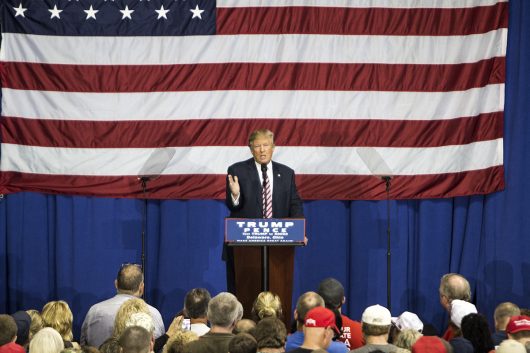
Donald Trump speaks after the final Presidential debate in Delaware, Ohio on Oct. 20. Credit: Alexa Mavrogianis | Photo Editor
President Donald Trump signed a new executive order on Monday, effective March 16, that temporarily suspends immigration from six Muslim majority countries — Iran, Libya, Somalia, Syria, Sudan and Yemen. The order could potentially affect the travel in and out of the U.S. for 93 students, depending on their exact documentation, and also temporarily bans the issuance of long-term visas for all foreign nationals.
The new order will be effective for 90 days and is a reworking of Trump’s original ban, which was introduced on Jan. 27 and then suspended by the courts that same week. The January order was met with protests throughout the country, including a campus blackout organized by 10 student organizations to protest the travel ban, which took place on Feb. 3 at Ohio State.
“You can’t just blanket everybody and call them all terrorists and say, ‘We need to know who we’re letting in,’” said Leen Amin, a fourth-year in international studies and world politics, and the president of the Arab Student Association at OSU. “Stuff like this scares me, because I’m originally from Palestine and from Jordan, and yeah, those countries aren’t on the list, but if I had been born in any other country my family could have been affected.”
The first travel order, which resulted in legal permanent residents being caught up in the ban, resulted in the wife of an OSU student being detained and almost deported to Iran when attempting to enter the U.S. at John F. Kennedy International Airport in New York. OSU identified 94 students that could have been locked out of the country if they had left and tried to return under the previous travel ban.
Of the students previously affected by the ban, one student from Iraq will no longer be affected under the new order. However, 62 students from Iran, 16 students from Libya and 15 scholars from Iran might be affected depending on their documentation status.
Amin’s organization took part in the blackout, and she said many of the members and their families come from the six banned countries.
The order no longer bans immigration from Iraq, citing the United States’ diplomatic presence, Iraq’s commitment to defeat Islamic State and the close relationship between the U.S. and Iraq as reasons for different treatment.
“I’m really happy to see that Iraq was taken off the list,” Amin said. “After all, the United States is the reason why Iraq has the refugee problem to begin with.”
As for those who come from the six listed countries, there are now means for exemption and waivers to gain re-entry to the U.S. Exceptions include permanent residents of the U.S., foreign nationals with documentation other than a visa that permits them to travel to the U.S., and those granted asylum.
Some instances of entry can be reviewed by U.S. Customs and Border Protection officials on a case-by-case basis, including those in the U.S. for a “continuous” period of work, study or long-term activity effective before or on the date of the order. The new order blocks the issuance of new visas to those seeking long-term stays in America.
While the executive orders could affect many who did not obtain visas prior to Jan. 27, it will not affect OSU’s recruitment of international students.
“Our recruitment efforts mirror efforts from previous years,” Keith Gehres, director of outreach and recruitment at OSU said in a statement. “While we are aware of potential questions the new executive order may prompt from prospective students, we are prepared to work with those who want to study at Ohio State, and we are committed to helping meet the university’s goal of enrolling a diverse class of new students from around the world.”
Amin said the ban could potentially have a negative impact on Muslim students at OSU.
“It just makes them feel not welcome in this country which is ironic because this is a country that was built by immigrants for immigrants,” Amin said.
However, some students do not see this order as a direct attack on Muslims. Kenny Horsley, a member of Ohio State’s chapter of Students for Trump and a first-year in political science said it affects immigrants from the Muslim-majority countries no matter their religious background.
“As far as anybody who properly goes through and reads a decent news source about the executive order, and reads up on it, (the order) should have no opinion based on the religion of the person coming into the country affected. It is not a Muslim ban,” Horsley said, on behalf of Students for Trump.
In the original order, refugees which were a religious minorities in their country or origin, such as Christians from Iraq, were to be given priority status. Horsley said the organization supports the president in his directives on immigration, arguing it is keeping America safe and looking to properly vet people coming from at-risk countries.
The order also shuts down the Refugee Admissions Program for 120 days to give the federal government time to develop “extreme vetting” processes. According to the executive order, the program will accept no more than 50,000 refugees each year, 60,000 people fewer than the cap set by President Barack Obama. Additionally, Syrians are no longer under an indefinite ban from entering the U.S.


